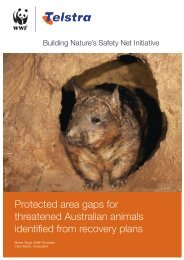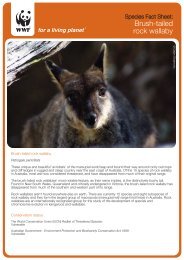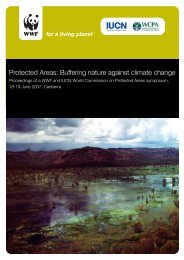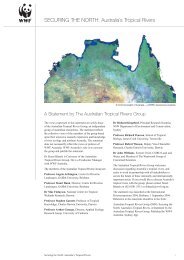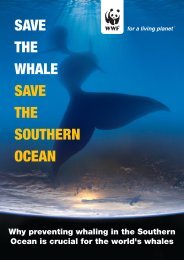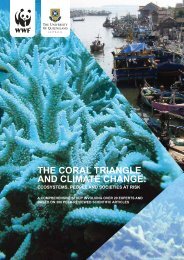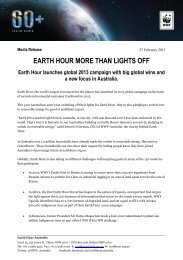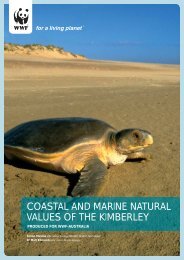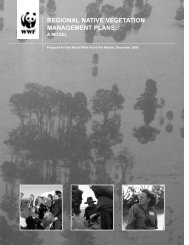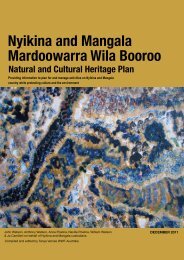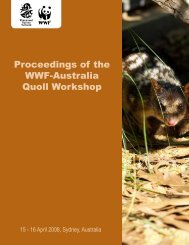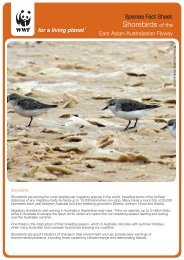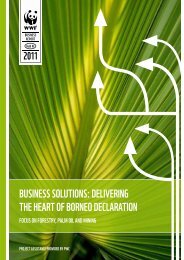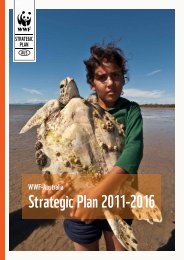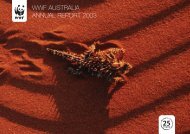Indigenous Peoples and Conservation Organizations
Indigenous Peoples and Conservation Organizations
Indigenous Peoples and Conservation Organizations
Create successful ePaper yourself
Turn your PDF publications into a flip-book with our unique Google optimized e-Paper software.
Annex 153<br />
19. WWF seeks out partnerships with local communities, grass roots groups, non-governmental organizations,<br />
governments, corporations, international funding institutions, <strong>and</strong> other groups, including<br />
indigenous communities <strong>and</strong> indigenous peoples’ organizations, who share WWF’s commitment to<br />
the following conservation objectives:<br />
i) <strong>Conservation</strong> of biodiversity: to conserve biological diversity at the genetic, species, <strong>and</strong><br />
ecosystem levels; to improve knowledge <strong>and</strong> underst<strong>and</strong>ing of species <strong>and</strong> ecosystems; to protect<br />
endangered species of animals <strong>and</strong> plants; to maintain ecosystem functions; to maintain<br />
protected areas <strong>and</strong> improve their management.<br />
ii) Sustainable use of resources: to ensure that any harvest of natural resources is sustainable; to<br />
support community management of renewable resources according to subsistence <strong>and</strong> cultural<br />
needs; to use recycling methods where appropriate; to use resource-efficient methods <strong>and</strong> technologies;<br />
<strong>and</strong> to substitute non-renewable with renewable resources wherever possible.<br />
iii) Pollution prevention: to prevent, wherever possible, discharges of environmentally damaging<br />
substances, <strong>and</strong> ensure that products <strong>and</strong> processes are non-polluting.<br />
III.Principles of Partnership<br />
20. The following principles will govern: (i) WWF conservation activities within indigenous peoples’<br />
l<strong>and</strong>s <strong>and</strong> territories; (ii) WWF partnerships with indigenous peoples’ organizations; (iii) WWF partnerships<br />
with other organizations whose activities may impact upon indigenous peoples.<br />
21. Whenever it promotes conservation objectives, <strong>and</strong> in the context of its involvement in conservation<br />
activities affecting indigenous peoples’ l<strong>and</strong>s <strong>and</strong> territories, WWF will encourage governments to “take<br />
steps as necessary ... to guarantee effective protection of [indigenous peoples’] rights of ownership <strong>and</strong><br />
possession” of those l<strong>and</strong>s <strong>and</strong> territories, as determined by the ILO Convention 169 (Art. 14).<br />
22. Prior to initiating conservation activities in an area, WWF will exercise due diligence to:<br />
• seek out information about the historic claims <strong>and</strong> current exercise of customary rights of indigenous<br />
peoples in that area; <strong>and</strong><br />
• inform itself about relevant constitutional provisions, legislation, <strong>and</strong> administrative practices<br />
affecting such rights <strong>and</strong> claims in the national context.<br />
23. When WWF conservation activities impinge on areas where historic claims <strong>and</strong>/or current exercise of<br />
customary resource rights of indigenous peoples are present, WWF will assume an obligation to:<br />
• identify, seek out, <strong>and</strong> consult with legitimate representatives of relevant indigenous peoples’<br />
organizations at the earliest stages of programme development; <strong>and</strong><br />
• provide fora for consultation between WWF <strong>and</strong> affected peoples, so that information can be<br />
shared on an ongoing basis, <strong>and</strong> problems, grievances, <strong>and</strong> disputes related to the partnership can<br />
be resolved in a timely manner.<br />
In addition, consistent with the relevance <strong>and</strong> significance of the proposed activities to the achievement<br />
of conservation objectives, WWF will be ready to:<br />
• assist indigenous peoples’ organizations in the design, implementation, monitoring, <strong>and</strong> evaluation<br />
of conservation activities, <strong>and</strong> to invest in strengthening such organizations <strong>and</strong> in developing relevant<br />
human resources in the respective indigenous communities;<br />
• assist them in gaining access to other sources of technical <strong>and</strong> financial support to advance those<br />
development objectives that fall outside WWF’s mission.<br />
24. In instances where states or other stakeholders, including long-term residents, contest the rights of<br />
indigenous peoples, WWF will be ready to assist indigenous peoples to protect, through legally<br />
accepted mechanisms, their natural resource base, consistent with the achievement of WWF’s<br />
Mission <strong>and</strong> subject to availability of resources.



